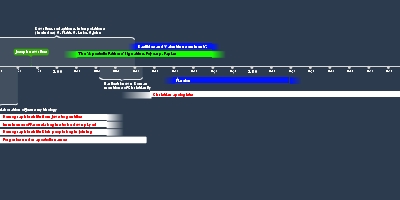Forgeries / Attributions under various apostolic names | Gnostics (jan 1, 50 – dec 31, 399)
Description:
Jesus cult writers begin forging works under the names of earlier personalities from the movement or other legendary figures, a practice that persists throughout the period. Many such works make it into the New Testament canon. Paul is the prime target for this treatment, indicating that his posthumous influence within the movement was strong; this may be a consequence of the competing Jerusalem faction having been wiped out by the war. Jesus clubs near those who have writings from Paul may have decided they wanted their own, Colossae being the earliest known example of such. An anonymous encyclical based on Colossians is later tagged as belonging to Ephesus. 2 Thessalonians, forged to dial down Paul’s own belief in the imminence of Jesus’ return, itself acknowledges the possibility of Pauline forgeries in the author’s present day.Alternatively, a small number of anonymous works receive glosses or traditional authorship attributions in order to enhance their credibility.
"Paul":
Colossians (50-80 CE)
Hebrews (attempted forgery?) (50-95 CE)
2 Thessalonians (80-100 CE)
Ephesians (80-100 CE)
1 Timothy (100-150 CE)
2 Timothy (100-150 CE)
Titus (100-150 CE)
Preaching of Paul? (150-250 CE)
Coptic Apocalypse of Paul (150-300 CE)
Prayer of the Apostle Paul (150-300 CE)
Epistle to the Laodiceans (and Epistle to the Alexandrians?) (150-350 CE)
"James" (the Just):
James (70-100 CE)
Apocryphon of James (100-150 CE)
Infancy Gospel of James (140-170 CE)
"Peter":
Gospel of Peter (70-160 CE)
1 Peter (80-110 CE)
Apocalypse of Peter (100-150 CE)
2 Peter (100-160 CE)
Acts of Peter and the Twelve (150-225 CE)
Letter of Peter to Philip (170-220 CE)
Coptic Apocalypse of Peter (200-300 CE)
"Barnabas:"
Epistle of Barnabas (80-120 CE)
"Jude":
Jude (90-120 CE)
"John":
Apocryphon of John (120-170 CE)
All the apostles:
Epistula Apostolorum (140-150 CE)
Acts of Thomas? (200-225 CE)
Didascalia (200-250 CE)
Apostolic Church Order (200-330 CE)
Hermes Trismegistus:
Discourse on the Eighth and the Ninth (150-300 CE)
Melchizedek:
Melchizedek (150-300 CE)
Allogenes:
Allogenes, the Stranger (150-350 CE)
Pontius Pilate:
Report of Pilate to the Emperor Claudius (150-400 CE)
Zostrianos:
Zostrianos (200-230 CE)
Seth:
Three Steles of Seth (200-230 CE)
The Holy Book of the Great Invisible Spirit (200-350 CE)
Norea (daughter of Eve)
Hypostasis of the Archons (200-300 CE)
---
Added to timeline:
Date:
jan 1, 50
dec 31, 399
~ 350 years
